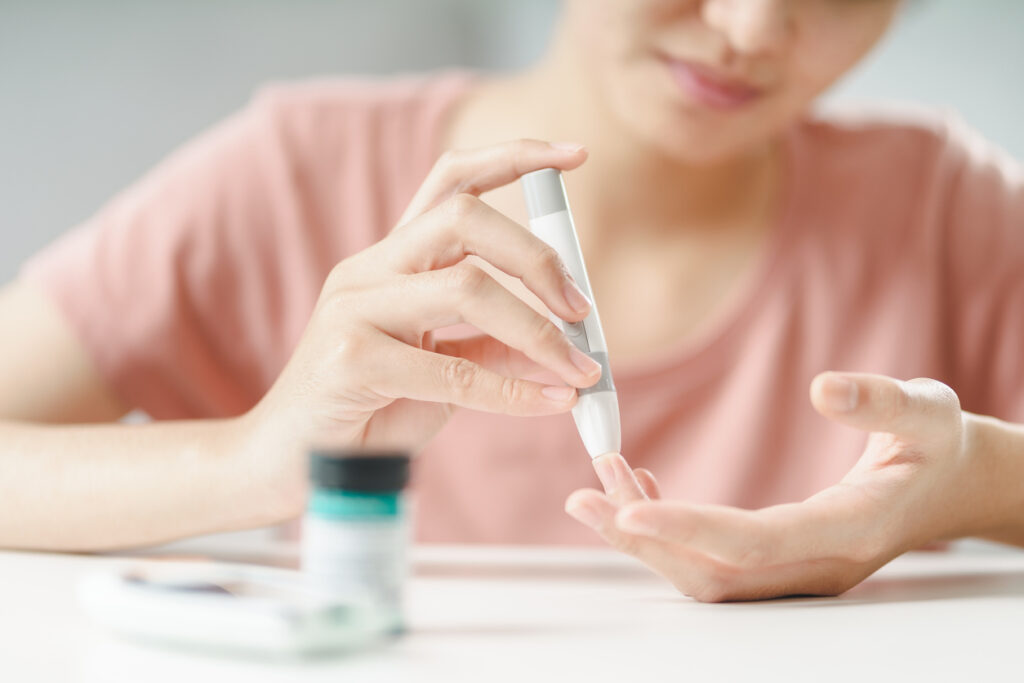November is National Diabetes Month, and today is National Diabetes Day. As we age, we need to pay special attention to our breast health, our brain health, our heart health, and our bone health. Clearly, hormonal imbalance impacts all of these. But did you know that diabetes has a direct link to each one of these, too? Today I am releasing a longer article, packed with many references to help you understand the gravity of the situation and some things you can do to prevent diabetes.

The Epidemic
While the global Coronavirus Pandemic brought us to our knees, the “Diabetes Epidemic” deemed by the CDC and many experts has seemingly gone unnoticed by the public.
Today, more than 37.3 million people in the U.S. have diabetes. Another 96 million have the silent warning of pre-diabetes. In more relatable numbers, one in 10 has the disease, and one in three has the warning of pre-diabetes. It is expected that 40 percent of Americans will get diabetes. Those are astronomical numbers! Compared to Covid-19, these numbers are just staggering; however, these stats are rarely making the nightly news. (1)
Globally, the numbers are equally distressing and are growing even more rapidly in low- and middle-income countries. The WHO reports that Diabetes rose from 108 million in 1908 to 422 Million in 2014. (2)
Types 1, 2, and 3 and pre-diabetes
Type 1 diabetes is an auto-immune disease that usually begins early in life, before age 20. Basically, the pancreas stops making insulin. As a result, blood sugar levels rise as the sugar cannot be transported from the blood into the cell. There are numerous deleterious physiological ramifications of high blood sugar. Type 1 diabetics are prescribed insulin to prevent or delay the onset of long-term health challenges.
It is Type 2 diabetes that has experts so concerned. The fiscal, physical, and even emotional toll presents a staggering burden. In fact, Dr. Babette Glister of Mercy Medical Center in Baltimore says, “It is rampant, horribly expensive, and very life-disrupting in so many ways.”
Type 2 diabetes is a lifestyle disease that is most often related to diet, obesity, and a sedentary lifestyle. While the pancreas may be healthy enough to pump out insulin, the insulin receptors are NOT responding to the insulin and become resistant to transporting sugar from the bloodstream into the cell for fuel. Instead, the excess sugar is turned to more fat around the middle, while wreaking havoc or disorders of the circulatory, nervous, and immune systems. New research emphasizes this point by showing that even moderate amounts of added sugar (particularly fructose and sucrose) doubled the body’s production of fat in the liver, which is the first step in the development of many diseases, including fatty liver and diabetes. (3)
Unfortunately, the fallout is a major cause of blindness, kidney failure (and often dialysis), heart attacks, stroke, and lower limb amputation. Additionally, recent studies have shown that diabetics have a 55 percent increase in their risk for depression! What a toll! (4)
Diabetes is killing us physically, and it is fiscally costing the U.S. $327 Billion per year. It’s now the most expensive chronic illness! Just the cost of insulin therapy alone can cost patients $9,600 annually out of their own pocket. A vial of insulin can cost $70 to $300, depending on insurance benefits. Also, depending on the dosage and severity of the disease, people may have to pay several hundred to $1,000 WEEKLY out of pocket!
This does NOT even account for lost productivity or the myriad of disease complications listed above.
Pre-diabetes
As I wrote above, prediabetes is a silent epidemic that is impacting over 88 million people in the U.S. alone. A shocking 70 to 90 percent are completely unaware they have prediabetes. The best way to check for this is to ensure your doctor runs these blood tests for you yearly. And, as a patient, YOU deserve to know these numbers and track the trends.
Type 3 diabetes
While it’s been known for many years that diabetics have a higher risk of Cardiovascular disease, strokes, and even dementia, a shocking study in 2012 found that key areas of the brain actually start shrinking when blood sugars hit the high end of “normal.” This happens even when other cofounders, such as smoking and high blood pressure, were taken into account. (5) Goodness: if one has cereal for breakfast, a soda or treat before lunch, processed carbs for lunch, a snack in between meals, and then processed carbs for dinner and a bedtime snack, blood sugars are above normal all day. This, unfortunately, is “normal” in our culture, but is clearly not optimal.
Did you know that Alzheimer’s is now being called “Type 3 diabetes” due to insulin resistance in the brain? A variant of what is known as the Alzheimer’s gene, Apolipoprotein 4 or ApoE4, interferes with the brain cells’ ability to use insulin, which can actually cause the cells to starve and die. Again, it’s the insulin signaling that is not functioning.
Now, “normal” is not always “optimal.” In functional medicine, our goal is to optimize function in the body and understand what has caused a given set of symptoms or a disease state, and then get to the root cause. Simply put, instead of just prescribing a drug like insulin, the goal is to get to the root cause and treat that, thereby supporting the body to heal.
What are the warning signs of diabetes?
Typically, a fasting blood sugar of 126 or higher on two separate tests is diagnosed as diabetes. Fasting levels of 100 to 125 is diagnosed as prediabetes, and <100 mg/dl (5.6 mmol/L) is considered “normal.”
The old adage of “what you don’t know can’t hurt you” is absolutely wrong in most matters of health. It is very important to know the warning signs and symptoms of diabetes, so silent high blood sugars are not sabotaging your health. The most common symptoms are (6)
- Frequent urination
- Feeling hungry all the time
- Dry mouth /increased thirst
- Fatigue
- Blurry or poor vision
- Yeast infections
- Slow healing of wounds
- Unexpected weight loss
- Headaches
- Velvety dark skin areas
- Numb or tingling in the feet
- Erectile dysfunction
- Itchy skin
- Nausea and vomiting
- Dizziness or feeling unsteady and weak
Prevent, Delay, and Reverse
For those who may have the genes that put you at higher risk, delaying the onset will dramatically reduce the complications of diabetes from taking over your long life. Although it is hard work, Type 2 diabetes CAN be reversed!!
Personally and professionally, I love the work of Dr. Daniel Amen and his renewed Amen Clinics, where he scans brains to get specific objective data about the health of your brain. He refers to “brain envy” that one will get once you see your brain scan compared to someone taking good care of themselves. When it comes to diabetes, he says, “If you don’t want to become a diabetic, then eat like one.” What does that mean? That means reducing the number of foods that quickly turn to sugar and cause a glucose and insulin spike. Certainly, adding high-fiber food, like veggies, at the beginning of your meal will help. Consuming 1 tbsp of vinegar in your water before you eat can also blunt your blood sugar spike, too.

My friend Jim (name changed) was determined that he could reverse his new diabetes diagnosis with diet and exercise. In one year, with a very low-carb diet, he lost 70 pounds and dropped his fasting blood sugar from 130 to 70 mg/dl. He was able to reverse his diabetes completely. Now that’s amazing!!
I have the ApoE4 genotype, which makes one at higher risk for Alzheimer’s, and I have the genes for diabetes, too. But as I’ve learned in studying Epigenetics, our genes are NOT our destiny. I have kept my blood sugars in a healthy range through my diet, exercise, and the additional gift of Glutathione support.
Now – what’s glutathione got to do with it?
God has designed our bodies to heal IF we detox what is causing problems and then nourish our systems properly. In fact, glutathione, the master cell protector, is, for me, additional evidence of the grandeur of God’s design of the human body. He has given us, within each cell, a system to protect our cells against disease. Yes, it does drop with age, and when we place our bodies under various stressors – like environmental toxins; sleep deprivation; processed, high sugar-laden foods; stress; alcohol; and drugs, to name just a few. As our levels of glutathione decline, the diseases of aging increase in a perfect inverse ratio. As fast as your glutathione levels drop, then you are at higher risk for the diseases of aging—including diabetes.
But what does glutathione have to do with diabetes, you might ask?
Glutathione (GSH) participates not only in the antioxidant defense systems of every cell and every organ but also in many metabolic processes. Therefore, its role in our health cannot be overstated. GSH depletion results in the risk of cellular oxidative damage (think of a rusty car). Thus, as expected, GSH imbalance is observed in a wide range of pathological/disease conditions, including diabetes, cardiovascular disease, cancer, and aging. It is this oxidative stress that has been suggested to play a main role in the “pathogenesis (disease progression) of Type 2 diabetes and its complications. (7)
In clinical trials with diabetics, it was discovered that Type 2 diabetic patients had lower Glutathione levels compared to the control subjects.
To reduce our risk of developing Type 2 diabetes, there is no dispute that a healthy diet—minimizing processed carbohydrates and including lots of fresh green veggies—weight loss and exercise are critical. Yet, it also seems very wise to add Glutathione support to optimize the function of insulin and blood sugar utilization. Optimizing your Glutathione levels will help your body fight the oxidative damage you are exposed to daily. Again, it helps every cell and every organ function more optimally.
My recommended Glutathione support
After years of research, the best glutathione support product I have found is fueled by RiboCeine™. It took nine PhDs 25 years to solve the puzzle of how to effectively get the precursors for glutathione through the digestive tract and into the nucleus where they can then do the magic—raising GSH levels up to 300%.
In a study published in 2018 that compared Insulin, RiboCeine, Metformin, and other Oral Hypoglycemic agents (oral medications for Diabetes), it was fascinating to see that RiboCeine actually lowered blood sugar almost as effectively as insulin, and RiboCeine was more effective than Metformin and other oral medications. (8)
If you, or someone you know, is struggling with diabetes, then I’d seriously consider adding RiboCeine to your regimen to support your healing efforts. While the initial goal may be blood sugar control, the long-term benefit for every cell in the body is glutathione’s antioxidant, anti-inflammatory, detoxification, and immune-boosting benefits. You can learn more about RibCeine on my website.
Here’s to years of protecting your breasts, your brain, your breasts, your bones, and your heart without the worry of Diabetes.
References
- https://www.cdc.gov/diabetes/data/statistics-report/index.html
- https://www.who.int/news-room/fact-sheets/detail/diabetes
- https://scitechdaily.com/even-moderate-amounts-of-added-sugar-doubles-bodys-fat-production/?fbclid=IwAR00mKlTp-BnawO32-xTfU4R5uLgFIxSFH2X7tOAVskGdtqwrD52tyQBLZg
- https://www.danielplan.com/psychodiabetes-sugar-on-the-brain/
- https://n.neurology.org/content/79/10/1019.
- https://diabetics.guide/16-early-signs-of-diabetes/16/
- https://pubmed.ncbi.nlm.nih.gov/22186191/
- https://www.ncbi.nlm.nih.gov/pmc/articles/PMC5991679/

